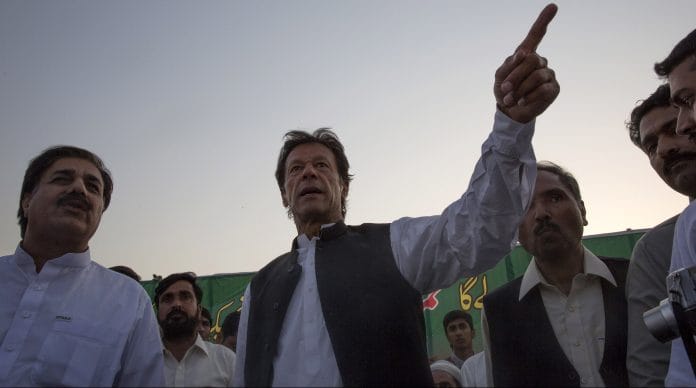Challenges confronting Pakistan intractable, expectations among voters high & Imran’s political capacity limited, writes award-winning author Pankaj Mishra.
Four years ago, on the day Narendra Modi was elected prime minister, I wrote that India was entering its most sinister phase since independence. This was a well-grounded fear for anyone who had noted Modi’s steadfast commitment to Hindu supremacism and the fragile state of India’s economy. Today, with Modi failing to create jobs or eradicate corruption, his government has resorted to fueling violence against minorities and assorted “anti-nationals.” As Imran Khan prepares to become Pakistan’s new prime minister, it is not unreasonable to fear that South Asia is lurching into its most turbulent phase since 1947.
It is true that, unlike Modi, Khan has no tainted record of governance. Nor has he beaten the drums for a far-right ideology since his childhood. He came to politics in his 40’s, after a career in sports and philanthropy; and, unlike Modi, he was known as a playboy of the Western world.
This broad experience — of upper-middle-class Lahore and plutocratic London, piety as well as hedonism — might incline one to give him the benefit of the doubt, and credit him with ideological flexibility rather than fanaticism. Indeed, Khan’s oft-expressed commitment to social justice is admirable in a society that routinely profanes this ideal. Yet, while waiting impatiently in the anteroom of power, he has manifested some disturbing tendencies.
Personality traits are hardly inconsequential in politics, as Donald Trump has revealed in his earth-shaking stint as the world’s most powerful man. In the case of Khan, another unproven outsider in mainstream politics, they’re a crucial clue to how he will comport himself in office.
It has long been clear that he has a Trump-sized ego, which success in sports and easy erotic conquests helped build. He entered politics in the 1990’s with a sense of entitlement common among the political dynasties he scorns, and a series of setbacks seemed merely to harden his certainty that political power in Pakistan was his birthright.
Convinced that he is the divinely ordained agent of Pakistan’s transformation, Khan has in recent years cut a furious swathe through his country’s frail democratic institutions. He has injected a hysterically antagonistic tone into Pakistan’s politics, which decades of coups and assassinations had already degraded into a zero-sum affair. For someone claiming to be revolutionary, committed to destroying Pakistan’s venal dynastic elites, he has seemed overly eager to strike deals with the ancien regime — its sleazy politicians, fundamentalists on hire, murky spies and megalomaniacal army officers.
Professing to be a “real liberal” — as opposed to those he calls “Westoxified” liberals — Khan has vigorously defended Pakistan’s draconian anti-blasphemy law. He has also done little to restrain members of his personality cult from virulently attacking his detractors, especially women and Westoxified liberals, on social media.
The fanatical zeal of these trolls suggests that Khan has, like Modi, successfully transmitted his extravagant and long-thwarted dream of glory and power to many of his followers. Pakistan has one of the world’s youngest populations, with 64 per cent of its people below the age of 30. Like their Indian counterparts, who bought Modi’s claim to possess a 56-inch chest, the young in Pakistan tend to vicariously identify themselves with a politician who radiates hyper-masculine virility rather than intellectual refinement or political skill.
But a tragic gap exists between their digitally stoked fantasies of individual empowerment and the harsh reality of their country — signified at present by a heavily indebted economy dependent on dodgy Chinese loans.
In a conciliatory acceptance speech, Khan invoked the intention with which he entered politics two decades ago: to redeem the unfulfilled potential of his country. He graciously reached out to his adversaries, and one can only hope at this juncture that he will work hard with them to create what he calls “Naya” (new) Pakistan.
Many of his own words and deeds, however, have helped ensure that Naya Pakistan will have more than a touch of Purana (old) Pakistan. Moreover, many of the challenges confronting his country are intractable. Expectations among his voters are so high, and his political capacity so limited and moral authority so depleted, that failure seems more likely than success at this point.
Defeats and setbacks, as Modi’s current maneuvers in India suggest, could make Khan desperate to consolidate political support by stoking fear and loathing of critics and dissenters. Khan has started well, with noble intentions and plenty of goodwill. But it isn’t premature to worry that the fate of India and Pakistan, or one-fifth of the human population, now lies in the hands of two macho men, who promise themselves and their followers the moon, and whom failure makes reckless.- Bloomberg







Monsoor bhai, this writer Pankaj Mishra has no fair idea even about his own Indian PM. So he has depicted his own vague idea about Imran. So please ignore his article.
Absolutely.
Dear Writer:
I am a Pakistani, and i have some questions for you.
Have you met Imran Khan in person?
Have you worked with him?
What i see here is that some journalists like you who dose not know something but are tasked to write on a subject tend to read what His rivals had been saying about him which are all lies.
I think there are many Indians who know Imran personally so you should have approached them and asked them about who Imran is and what does he stand for and more over do you believe what he said in his speech.
And do show them what you had written because i do believe you will get a harsher response from them for your un-professional approach where you failed to properly do your home work and didn’t research the matter thoroughly.
Absolutely